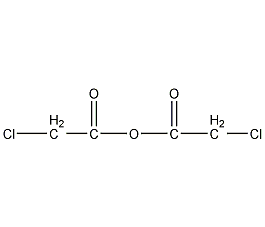
Structural formula
| Business number | 05L6 |
|---|---|
| Molecular formula | C4H4Cl2O3 |
| Molecular weight | 170.99 |
| label |
Chloroacetic anhydride, Chloroacetic anhydride |
Numbering system
CAS number:541-88-8
MDL number:MFCD00000929
EINECS number:208-794-2
RTECS number:None
BRN number:774533
PubChem ID:None
Physical property data
1. Characteristics: Colorless to slightly yellow crystals with a pungent odor. [1]
2. Melting point (℃): 46[2]
3. Boiling point (℃): 203 [3]
4. Relative density (water = 1): 1.55[4]
5. Relative vapor density (Air=1): 3.2[5]
6. Saturated vapor pressure (kPa): 0.13 (67.2℃)[6]
7. Octanol/water partition coefficient: -0.07[7]
8. Solubility: soluble in ether and chloroform, slightly soluble in benzene, insoluble In petroleum ether. [8]
Toxicological data
1. Acute toxicity No data available
2. Irritation No data available
3. Sensitization[9] Has sensitizing effects
Ecological data
1. Ecotoxicity No data available
2. Biodegradability No data available
3 .Non-biodegradability No information available
Molecular structure data
1. Molar refractive index: 32.08
2. Molar volume (cm3/mol): 117.9
3. Isotonic specific volume (90.2K ): 297.9
4. Surface tension (dyne/cm): 40.7
5. Polarizability (10-24cm3): 12.71
Compute chemical data
1. Reference value for hydrophobic parameter calculation (XlogP): 1.1
2. Number of hydrogen bond donors: 0
3. Number of hydrogen bond acceptors: 3
4. Number of rotatable chemical bonds: 4
5. Number of tautomers: none
6. Topological molecule polar surface area 43.4
7. Number of heavy atoms: 9
8. Surface charge: 0
9. Complexity: 109
10. Number of isotope atoms: 0
11. Determine the number of atomic stereocenters: 0
12. Uncertain number of atomic stereocenters: 0
13. Determine the number of chemical bond stereocenters: 0
14. Number of uncertain chemical bond stereocenters: 0
15. Number of covalent bond units: 1
Properties and stability
1. Stability[10] Stable
2. Incompatible materials [11] Strong oxidants, acids, alkalis, alcohols, amines
3. Conditions to avoid contact[12] Humid air
4. Polymerization hazard[13] No polymerization
5. Decomposition products[14] Hydrogen chloride, phosgene
Storage method
Storage Precautions[15] Store in a cool, dry and well-ventilated warehouse. Keep away from fire and heat sources. The packaging must be sealed and protected from moisture. They should be stored separately from oxidants, acids, alkalis, alcohols, and amines, and avoid mixed storage. Equipped with the appropriate variety and quantity of fire equipment. Suitable materials should be available in the storage area to contain spills.
Synthesis method
Purpose
Used in organic synthesis. [16]

 微信扫一扫打赏
微信扫一扫打赏

